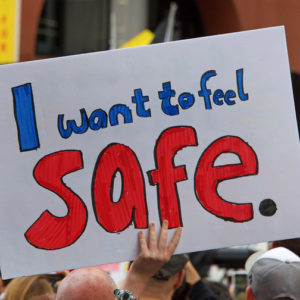Rapper Young Dolph was killed recently inside Makeda’s Homemade Butter Cookies in his hometown of Memphis, Tennessee, leaving behind two children and legions of fans all over the country. It was the second time he had been the victim of a shooting, having survived being shot three times in Hollywood in 2017. His murder was one of 268 in Memphis so far in 2021, a record-breaking pace of carnage amid the 15,000 shootings local police have responded to this year. These shootings have left approximately 2,000 people injured and forever scarred.
Like Memphis, the entire United States is currently in the midst of a historic wave of gun violence. In some cities, like Philadelphia, guns are now the leading cause of death among young Black and Latino men. In 2020, the United States saw a 30 percent uptick in murder from 2019 and a record high of 77 percent of total murders perpetrated with a gun. In 2021, the numbers are even starker, as many state governments loosened gun restrictions. Tennessee and Texas, for example, even repealed permit laws for carrying weapons, which now allows residents to openly brandish weapons without having to meet any training requirements. As a result, more guns than ever are in our streets—and more people than ever are resorting to gun violence to resolve personal disputes.
But things don’t have to be this way. In response to this crisis, President Joe Biden and the House of Representatives have stepped up. In the Build Back Better Act, which passed in the House and now awaits a Senate vote, lawmakers pledged a $5 billion investment in community violence prevention programs. These resources will fund programs that will reduce gun violence using public health approaches, community empowerment, and targeted interventions that identify those who are at the highest risk of becoming victims or even perpetrators of gun violence. That funding would work with other public safety strategies, including supporting local law enforcement and federal efforts to stop illegal gun trafficking. As similar programs in cities like Oakland, California, and statewide in Massachusetts have shown, these programs work. Now, lawmakers have the opportunity to spread these types of programs across the country and save lives in all 50 states.
The American people understand the complexity of today’s gun violence problem—and that, to save lives, different contexts demand unique solutions. The Build Back Better funding plan includes resources for different types of community outreach that will save lives when working in unison with law enforcement, faith leaders, local elected officials, and community service organizations. The plan includes funding for Group Violence Intervention programs—like a new program that will be implemented in Memphis—that create collaborative efforts between law enforcement, local community organizations, and community members to provide social services to those at the greatest risk of violence. There will also be funding for Hospital-Based Intervention Programs that work as partnerships between emergency departments and community-based organizations to help trauma victims with conflict and case management while connecting them to wraparound support services following hospital discharge.
However, the fight to protect our neighborhoods is not yet over. With the House and president on board, all that remains is a vote in the Senate to get this funding to our communities in crisis. Every day that the Senate waits to vote is another day in which people who need support aren’t receiving it. We have the tools and the people to end today’s gun violence epidemic. The $5 billion investment in community violence prevention is the start of a long journey that will save lives. The Senate must move forward on the Build Back Better plan without delay to guarantee this funding reaches communities across the country, to break the cycle of violence, and to ensure children like Young Dolph’s no longer have to worry about growing up without a father.

